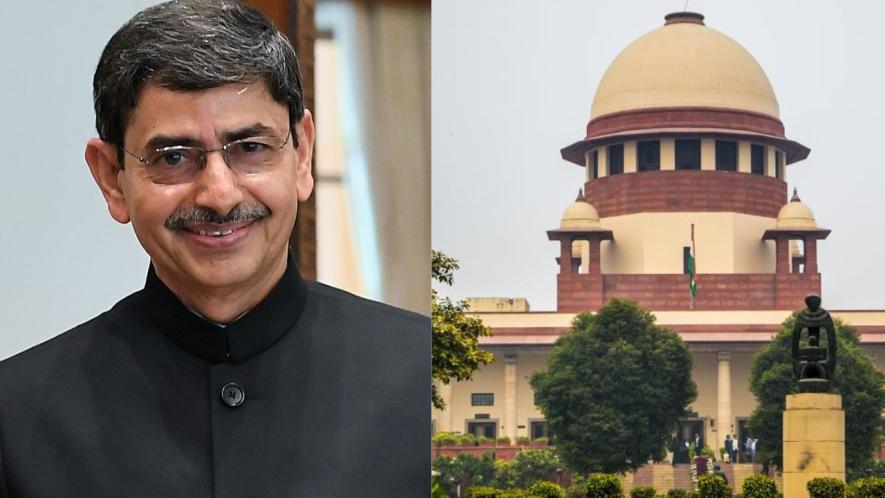Explained: SC on TN Governor’s Inaction

File Image
Finally, it seems that the Tamil Nadu Governor is being taught lessons in the Constitution—very costly lessons at that. Two eminent constitutional experts, Supreme Court Justices J.B. Pardiwala and R. Mahadevan, have delivered strong, almost throne-shaking lessons.
After the Tamil Nadu Legislative Assembly passed 10 Bills, the Governor, R N Ravi, who is the constitutional head of the state legislature, found himself in an ambiguous “trishanku” limbo—unsure whether to give assent, reject, or return the Bills.
The Supreme Court, in a brilliant verdict authored by Justice Pardiwala, stopped short of calling it a “constitutional crime” but emphasised that the Governor's actions were not in line with constitutional morality. TN Governor Ravi, was strongly rebuked in legal language that left little room for misinterpretation.
Under the Indian Penal Code (IPC) or the new Bharatiya Nyaya Sanhita (BNS), if a police officer or an IAS officer commits a crime, they can be jailed. But when a Governor, who is considered the constitutional head of all these officials, acts against the Constitution, there is no punishment. There are criminal offenses under the IPC, but apparently, no “constitutional crimes.”
The notable fact is that Governors operate under the full control of the Union government—particularly the Home Minister. Constitutional scholars and legal experts have long lectured on this, but now the Supreme Court has had to become the "headmaster" and deliver a stern lesson.
It’s not just the Tamil Nadu Governor. In states like Kerala, Punjab, Andhra Pradesh, West Bengal—and nearly every other state—Governors have been accused of violating the Constitution. History repeats itself, whether under the Congress or Bharatiya Janata Party governments. The Supreme Court has repeatedly had to step in and ask to "protect the Constitution, O Lord!"
But who punishes these wrongdoers? Nobody.
As of now, the real guardian of the Constitution is Article 32, authored by B.R. Ambedkar, who was recently celebrated in Parliament. But even though the Constitution does not contain a provision for directly removing a Governor, the President can dismiss them on the advice of the Home Minister or the Prime Minister—requiring just one signature.
Is it necessary for constitutional scholars to wear the sacred thread and preach lessons for such actions?
The phrase “as soon as possible” is not some grand legal jargon; it's just plain English. Article 200 of the Constitution is very clear. Inaction by a Governor is a severe offense. How can a government function if Bills passed by the state legislature are left in limbo?
In legal terms:
- "Must" implies compulsion.
- "May" implies discretion.
- "Shall" implies mandatory action.
This is the kind of lesson that must be taught, just as a teacher says, “Did you understand, children?”
The SC emphasised: don’t create roadblocks to democratic governance. Though the Constitution may not specify an exact time limit for every action, the Governor must act within a reasonable timeframe. The apex court made it clear: Governors cannot withhold assent simpliciter (i.e., arbitrarily or indefinitely). They must act with reasoning, not with prejudice or delay.
Before Independence, under the Government of India Act of 1935, Governors had full discretion. But under the current Constitution, that clause has been amended. There is no room for discretion anymore.
It’s shocking that there is even a need to remind Governors of their responsibilities under Article 200. After a Bill is passed by the state legislature, a Governor must decide—either give assent, return with objections, or refer it to the President. But to do nothing at all? That’s undemocratic and unconstitutional.
Clear Deadlines for Governors
The Supreme Court has now set clear guidelines:
- Governors cannot indefinitely keep Bills pending.
- If they have objections, they must return the Bill within three months.
- If they intend to refer it to the President, they must do so within one month.
- If the legislature passes the bill again, the Governor must give assent within one month.
The Court gave specific time limits for how long Governors can take:
- If withholding assent or sending to the President: within one month.
- If rejecting against Cabinet advice: return the Bill within three months, with reasons.
- If the Bill is re-passed by the Assembly: must give assent within one month.
The most important guideline: Once the Assembly passes the Bill a second time after reconsideration, the Governor cannot send it to the President again. If they wish to refer it initially, they must do so within one month. If not, then they must act within three months to decide on the Bill.
The Supreme Court also clarified when Presidential assent is necessary—only for matters related to national security or central concerns. Otherwise, the Governor must act within the scope of Article 200. Delaying indefinitely is not an option.
Vikas Bansod, eminent Supreme Court lawyer, advisor on Constitutional matters and a ‘political pandit’ in these areas, in an interview with this author, said that “even during Nehru’s time, Governors played political games in Karnataka, Bihar, Andhra Pradesh, and Kerala. The BJP governments have also played their part. During President’s Rule in states like Uttar Pradesh, Rajasthan, and Madhya Pradesh, the judiciary has ruled that such misuse of power must be corrected. In Andhra Pradesh, for instance, Governor Kumud Ben harassed N.T. Rama Rao’s government by refusing to assent to Bills. Later, Governor Ram Lal went so far as to dismiss NTR's government. This misuse was corrected only after the judiciary intervened”.
Bansod was an advisor to many Governors, such as Karnataka, Andhra Pradesh, and Kerala, at different times and explained the complicated political problems to the political leaders. He stated that even though Governors are supposed to have discretion, the Tamil Nadu Governor's action in keeping ten Bills pending violated the Constitution. The Supreme Court declared those Bills as NON-EST—as if they never existed—and stated that the President must now act.
To simplify the complexity of mystery of law:
1. Unconstitutional Behaviour: The Supreme Court said Tamil Nadu Governor R.N. Ravi acted against the Constitution by delaying decisions on 10 important Bills. He only sent them to the President after they were re-passed and the court got involved.
2. Governors Must Follow Timelines: The Court warned that Governors can’t take their time endlessly. They must act within a fixed time, and if they don’t, the courts can step in.
3. Deeming Bills Approved: The Court said that since the Governor and President delayed too much, it would consider the Bills as already approved (assented).
4. Governor Became a Roadblock: The Governor was seen as blocking the elected government’s work instead of supporting it. The Court reminded that a Governor should be a helpful guide, not an obstacle.
5. Misuse of Power: The Governor’s actions seemed to bring back colonial-era practices, where officials acted without considering the advice of elected ministers. This goes against what the Constitution intends.
6. Historic First: This is the first time in India that Bills have become law without formal approval from the Governor or the President.
7. Elected Government Wins: The Supreme Court backed the elected Tamil Nadu government, saying that Governors must follow the advice of the Council of Ministers in most cases.
8. Back Under Judicial Review: The Court’s ruling brings this issue—once outside the court’s reach—under judicial review. It also introduced the idea that if Governors delay too long, the Bill is treated as approved.
9. Concern About Two-Judge Bench: Some legal experts question whether such a big constitutional matter should’ve been decided by just two judges, instead of a five-judge bench.
10. Three-Month Deadline: The Court said the President must decide on State Bills within three months if the Governor sends them for her review.
11.Governor’s Actions Were Invalid: The Court said the Governor wrongly delayed the Bills and criticised the way they were suddenly sent to the President without any proper legal reason.
12. “Pocket Veto” Is Not Allowed: Governors sometimes delay Bills without saying yes or no—this is called a “pocket veto.” The Court said this is not allowed under the Constitution.
13. Delays Hurt Democracy: The Court said that the Constitution does not give Governors the power to silently reject Bills. Doing so weakens democracy.
15. Governor’s Decisions Can Be Reviewed in Court: The Court said any misuse of power or delay by the Governor can now be challenged in court.
16. Extraordinary Power Used (Article 142): The Court used its special powers to say the 10 Bills were approved, because the Governor ignored previous court rulings and gave no reasons for his actions.
17. Review Petition Coming: The central government (Home Ministry) is expected to challenge this judgment, especially the part allowing courts to intervene and setting deadlines for the President.
18. Larger Impact Across States: The judgment helps stop a growing trend where Governors in Opposition-ruled States delay or sit on Bills for political reasons. The ruling is seen as strengthening democracy and state governments.
M Sridhar Acharyulu is Professor of Law, Hyderabad. The views are personal.
Get the latest reports & analysis with people's perspective on Protests, movements & deep analytical videos, discussions of the current affairs in your Telegram app. Subscribe to NewsClick's Telegram channel & get Real-Time updates on stories, as they get published on our website.
























